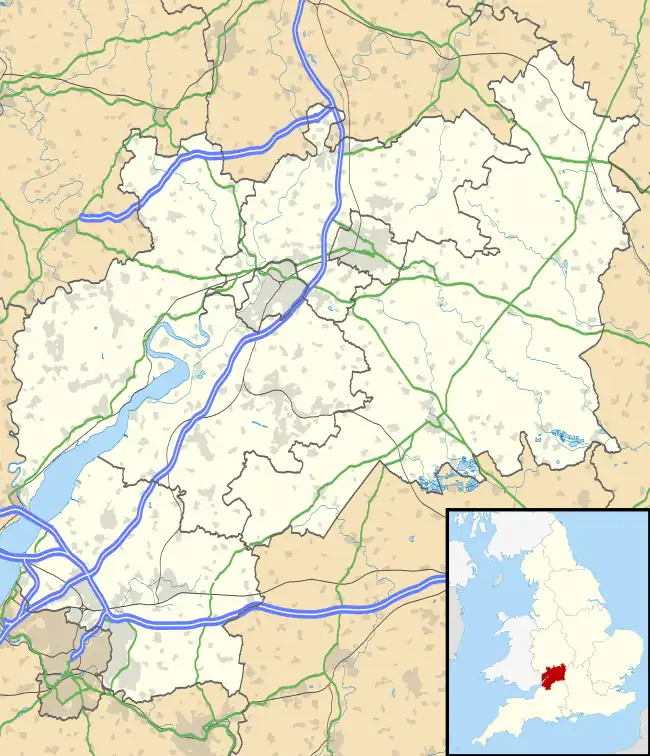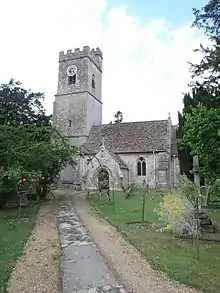| Whitminster | |
|---|---|
 Whitminster crossroads on the A38 | |
 Whitminster Location within Gloucestershire | |
| Population | 881 (2011 Census) |
| District | |
| Shire county | |
| Region | |
| Country | England |
| Sovereign state | United Kingdom |
| Post town | Gloucester |
| Postcode district | GL2 |
| Police | Gloucestershire |
| Fire | Gloucestershire |
| Ambulance | South Western |
| UK Parliament | |
Whitminster is a village and civil parish in Gloucestershire, England, and on the A38 trunk road approximately 6 miles (10 km) south of Gloucester and 6 miles (10 km) north-west of Stroud. The parish population at the 2011 census was 881.[1] The hamlet of Wheatenhurst is signposted from the A38 at Whitminster. Whitminster is close to the M5 motorway, with Bristol, South Wales and the south Midlands all within an hour's drive.
Wheatenhurst manor, with Whitminster House and the parish church of St Andrew, lies about 1 mile (2 km) to the west of the modern village. Plans for additional new housing were announced in Spring 2017.
Whitminster has two pubs: The Old Forge Inn, a traditional English pub, and The Whitminster Inn offering accommodation. There is a village shop, a chip shop, a Chinese restaurant and takeaway, and an Indian takeaway. The local school is the Whitminster Endowed C.O.E Primary School,[2]
History

The manor was originally known as Wheatenhurst—the name changed officially in 1945—and was recorded in the Domesday Book in 1086 as Witenhert.[3] The name means "white wooded hill", or possibly "wooded hill of a man named Hwita".[4] The name was corrupted to Whitnester and then Whitmister, and by the 17th century evolved by popular etymology to Whitminster. There was never a minster here. Either or both names were used of the parish until the 20th century, but the village on the A38 came to be known as Whitminster, whereas the smaller group of houses west of the main road in the centre of the parish came to be known as Wheatenhurst.[5]
The manor of Wheatenhurst was held by Brictric "of Newton Valence",[6] at the time of Edward the Confessor and post-Conquest it was held by Harding of Bristol in pledge from Brictric.[7] It later passed to the de Bohun family, as part of their large landholdings in the west of England.
Whitminster is used in the 1919 published short ghost story titled The Residence at Whitminster, by M. R. James, in his third collection of ghost stories, A Thin Ghost and Others. There appears to be no connection, apart from the name, with the real village, though the name of a major character in the story, the 16 year old Viscount Saul, is possibly inspired by Saul Junction, close to the parish church.
Notable people
- Richard Owen Cambridge, poet
References
- ↑ "Parish population 2011". Retrieved 31 March 2015.
- ↑ "Whitminster Endowed C of E Primary School". www.whitminstercofe.gloucs.sch.uk.
- ↑ Open Domesday Online: Witenhert , accessed June 2017
- ↑ Watts, Victor, ed. (2010), "Whitminster", The Cambridge Dictionary of English Place-Names, Cambridge University Press
- ↑ C. R. Elrington, N. M. Herbert, R. B. Pugh (editors), Kathleen Morgan, Brian S. Smith (1972). "Wheatenhurst or Whitminster: Introduction". Victoria County History. A History of the County of Gloucester: Volume 10: Westbury and Whitstone Hundreds. Institute of Historical Research. Retrieved 10 November 2013.
{{cite web}}:|last=has generic name (help)CS1 maint: multiple names: authors list (link) - ↑ "Brictric | Domesday Book".
- ↑ Domesday Book, Wheatenhurst, Gloucestershire
External links
![]() Media related to Whitminster at Wikimedia Commons
Media related to Whitminster at Wikimedia Commons
- Victoria County History: Wheatenhurst or Whitminster
- Whitminster (Wheatenhurst) GENUKI
- Whitminster Parish Council Website
- Whitminster Cricket Club
- OS Bench Marks in Whitminster
- audio history referencing Whitminster
51°46′18″N 2°19′40″W / 51.77167°N 2.32778°W